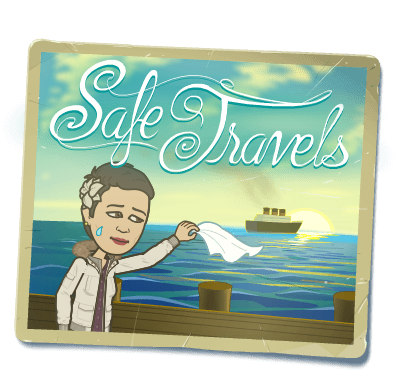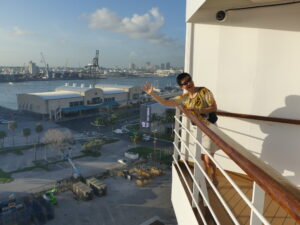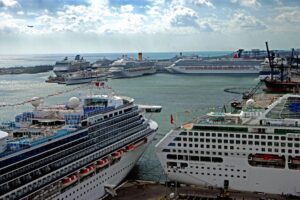
Two years ago I was set to embark on a New Year’s cruise out of Florida with eight members of my family. I was coming from the West Coast and the rest of my family was coming from the East. Long story short, weather delays caused me and 13 other guests to arrive at the pier 30 minutes after the all-aboard time. The ship was still there, but the Captain refused to board us and sailed away as we watched from the dock. This was the most horrific moment of my life!
Now before you say “you should always arrive a day early for your cruise”, I’ll state that I ALWAYS arrive early, especially if it is a port I haven’t visited before. I add in 3-4 days depending on how much there is to see and do there. If it is a port I have previously visited and I don’t feel the need to spend more time there, I would still arrive one day in advance to account for unforeseen delays.
Thus was the way I had planned this cruise, except this delay spanned more than one day so I lost my lead time. Due to severe weather which caused a domino effect on canceled flights across North America, and the fact I was traveling at the height of the holiday season, flights were already fully booked and anyone bounced off canceled flights were lucky to even get on another flight (which I eventually did).
Catching up with the ship was not a viable option as the ship was to call on the cruise line’s private island on Day 2 which means it is unreachable, and it was a sea day after that. The second port of call was Grand Turk and even if I managed to find a last-minute flight to this tiny island, I would have lost 3 days out of my 7-day cruise.
 Luckily thanks to a last-minute cancellation, a stateroom opened up on another 7-day sailing departing the next day, and the cruise line offered to book me on it. This meant my holiday and money were salvaged but it also meant I would not see my family as it is a completely different itinerary and our ships were not going to meet. It was that or I go home, so I chose the former.
Luckily thanks to a last-minute cancellation, a stateroom opened up on another 7-day sailing departing the next day, and the cruise line offered to book me on it. This meant my holiday and money were salvaged but it also meant I would not see my family as it is a completely different itinerary and our ships were not going to meet. It was that or I go home, so I chose the former.
Once onboard my “new” cruise, the ship's Guest Services team who by now has been fully informed of my predicament, bent over backward to ensure I was going to fully enjoy my cruise. The ship’s Captain reached out and offered his sincere condolences, to which I took the opportunity to ask him for insight on why the other Captain chose to leave 14 guests behind, especially since I have been on cruises where we waited for late arrivals.
While he could not speak for the other Captain, my Captain did share educational and insightful information from the ship operations point of view.
 Follow the leader
Follow the leader
There is an order in which ships leave port, and they must remain in sequence. If one ship is delayed, it will delay all others as they are not allowed to leave out of order. On a busy weekend, there could be 8-10 ships beginning their voyage, and the cruise ship I missed just happened to be the first in line to depart.
Not a hop, skip, and a jump
Embarking late guests isn’t as simple as lowering the gangway to let them hop on. Customs, immigration & homeland security procedures must be conducted shore-side and these personnel would have all packed up once all-aboard was called. Recalling them and reopening the facilities to process late guests is unfeasible. What we think takes 10 minutes will most likely take two hours by the time it is said and done. This will subsequently delay all other ships by that amount of time.
 Chain reaction
Chain reaction
If the itinerary includes a port of call on Day 2 (which mine did), a delayed departure will result in the late arrival at that port. Imagine all the logistics involved in a ship’s operations at a port – the guys who tie up the ship, customs and port authority personnel, excursion operators, and more are all planned for the ship’s arrival at a specific time. A late arrival would impact these plans.
But my ship was going to a private island on Day 2, so it could have arrived late and not be affected so much right? Well…yes and no. Yes in the fact that the island is owned and operated by the cruise line which means guests enjoy a beach day without any other outings. However, a late arrival means a shortened visit there, as the ship would still have to depart at the scheduled time to continue onward. Plus, the Captain needs to consider the other 2,000 guests onboard. Cutting into their time ashore because of a few latecomers isn’t exactly fair.
Had Day 2 been sea day, the Captain "might" choose to wait for late arrivals, as the ship can make up lost time at sea. However, this will require an increase in cruising speed, additional fuel consumption, and possibly a less comfortable ride for the guests.
Money matters
A delay also causes the cruise line extra money. Every minute the ship is late leaving port, the cost racks up – port fees, overtime wages for shore-side staff, and extra fuel burned to make up for lost time. A cruise ship is a business after all, and while I’m not saying this is always the case, but decisions may be made based on financial reasons.
 Lessons learned
Lessons learned
So what did I learn from this experience, what should travel advisors and cruising guests need to be aware of?
Ships can leave latecomers behind, no matter the number. My mistake in assuming the ship will wait because there were 14 of us proved to be erroneous.
I will now plan to arrive at my embarkation port TWO days early instead of one. And this applies year-round, not just over the winter months. With global warming, weather patterns are now unpredictable at any time of the year. Airplane mechanical issues can also happen at any time. And during the holiday season, even if there are other available flights, they may be fully booked if you need to be re-routed due to weather (as I experienced).
Bottom line
The responsibility to arrive at the pier on time rests entirely on the traveller. If circumstances allow, a ship may wait for latecomers, but it is not obligated to do so. And, a Captain’s decision to wait (or not) is made based on all circumstances in play – and is not a reflection of him/her being a nice (or uncompassionate) person. Of course, I was sad to have missed spending time with my family on holiday, but I hold no grudge against the cruise line, and fully accepted the Captain’s decision which in the nautical rule book, is final.
 One last piece of advice – purchase travel insurance! In my case, the airline voluntarily compensated my out-of-pocket expenses (which they were not obligated to do since the delay was due to weather). And since I made it onboard another sailing, I did not need to involve my insurance provider. However, had I not, the insurance coverage could have flown me to the next port to catch up, and pay for additional out-of-pocket expenses. [Policy terms vary between insurance providers, ensure you understand the full terms and conditions of coverage eligibility.]
One last piece of advice – purchase travel insurance! In my case, the airline voluntarily compensated my out-of-pocket expenses (which they were not obligated to do since the delay was due to weather). And since I made it onboard another sailing, I did not need to involve my insurance provider. However, had I not, the insurance coverage could have flown me to the next port to catch up, and pay for additional out-of-pocket expenses. [Policy terms vary between insurance providers, ensure you understand the full terms and conditions of coverage eligibility.]
